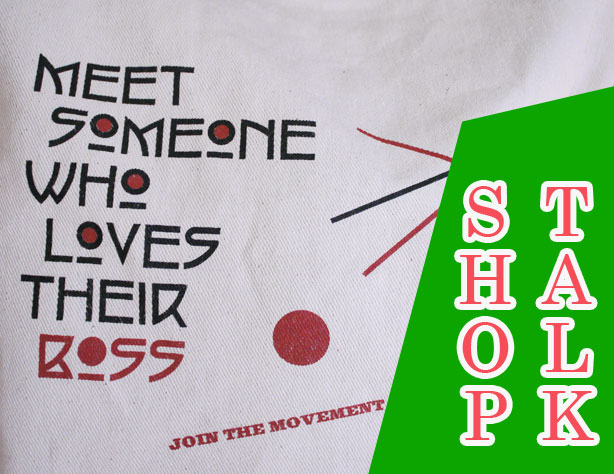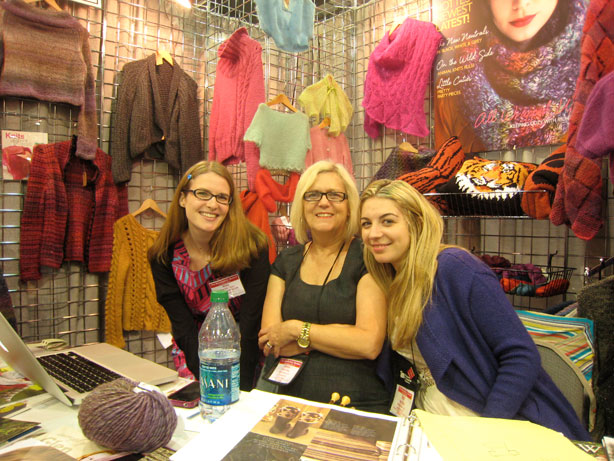Last night I realized that I didn’t have a Shop Talk post planned for today, and I started to feel a bit panicky. But then I remembered that there’s no one making me write these posts every Friday; in fact, I might be the only one who even notices if I don’t write one. Freedom! And yet here I am, writing a Shop Talk post. Why? Because my boss said so.

Don’t let any frustrated freelancers kid you—being your own boss is awesome. You get to set your own hours, you can drop everything for a new crazy project if you want to, you get to go to the grocery store during non-peak times… it’s like normal life, but better. All you have to do is be able to tell yourself what to do. That means more than just motivating yourself to get stuff done and managing time—it means setting goals and figuring out a career path on your own. These things can be really hard when you also feel like you’re kind of improvising all along the way.
Working for yourself requires a balance of structure and chaos, and solo work and collaboration. I think that’s reflected in this little list I’ve put together of things that help me be my own boss. Hey, speaking of lists…
Lists
When I was a kid, I hated any classroom exercise that involved lists or outlines. My creative powers couldn’t be boxed in! But at some point the awesomeness of list-making was revealed to me, and now I am all about lists: I make a list of goals at the beginning of each year, I make a list of stuff I want to do for each month, each week I start a list for stuff that I want to get done each day, and every morning I make a list for the day. Lists are the closest substitution for having someone tell you what to do, so the idea is to take them seriously. But it’s also important to know that lists can be constantly revised based on changing situations. I don’t usually get to everything on my day’s list, but that’s not a failure—the purpose of the list is so that I don’t have a moment in the day where I feel aimless or bored. There are probably hundreds of list-making apps for your phone, but I prefer to use simple text documents and sticky notes for mine, for instant access and easy revisions.
Deadlines
Deadlines serve a similar function as lists, but I use them in a different way. I make myself deadlines for significant stages in a project—for example, if I’m working on a new pattern, I set a date by which I’ll have something to send to my tech editor, a date for when I’ll send it to testers, and a date on which I’ll release the pattern on my website. I put all of these on my calendar along with my doctor appointments and galas and other important events. There’s something about putting things on my calendar (which is on my computer and sends alerts to me on my phone) that makes me take them seriously.
Time Off
Without a break, all the endless lists and looming deadlines can be a real slog, so taking time off is important, but tricky. I have no qualms about taking a Tuesday afternoon off to visit a museum, but then you’ll probably find me working most of the following weekend. And I’m never totally off of my email for any length of time—John and I have to be the 24-hour customer service staff if someone has a problem with a purchase. But aside from the annual burnout, I’ve found a way to balance my schedule so that it works for my own lifestyle—almost always working, but super flexible hours, and a few extra curricular projects. And at least a couple of actual sort-of days off each month. If that means moving deadlines back sometimes, that’s fine. Plus, big ideas need time and space to develop, so taking a walk on a beautiful morning instead of editing patterns can pay off.
Mentors
One of the tough things about my job is that, while there are tons of successful creative people out there whom I admire greatly, there’s no one person I can point to and say “I want to do what they’re doing,” and use them to model my career after. But that doesn’t mean that I can’t have mentors, experienced professionals who are willing to give me advice and help open some doors. I’ve been so lucky to encounter people who are generous with their time and resources just because I asked nicely and they liked my work enough to help me out. Without really consciously doing it, I’ve managed to put together a team of mentors who support various interests of mine, including yarn shop owners, authors, designers, artists, and artist reps. It’s important to have someone to turn to when I need some advice or an introduction, and these relationships all came about naturally, just through an email or because I talked to someone at an event.

Just hanging with Debbie and Nell Bliss, as you do.
Peers
Like mentors, peers are awesome for advice and sharing resources, plus they’re great for an empathetic response when I need one. My ideas about what’s possible in my own career have certainly be enhanced by seeking out other designers, authors, and artists who are going through a similar process as me. And like with my mentors, anybody who shares some aspect of my work can be a peer to me. Shout-outs to Stacey Trock and Kim Werker in particular!
Online Resources
Obviously, the internet is there to help. I don’t go overboard with reading advice for people running small businesses, but I do occasionally check out the Biz Ladies series on Design Sponge, which is written by guest bloggers who run amazing small, creative businesses. The Designers group on Ravelry, which I’ve been mentioning a lot lately, is also a great place for someone like me to be. I don’t post there myself very often, but just reading what other designers are talking about helps me feel like part of a community of professionals.
Being a good boss to myself is really different from being a boss to someone else, which I may have to do someday. But at least I’m pretty happy with my own boss, even if my boss thinks I could have written a better blog post today. Maybe it should have been two separate posts, about time management and figuring out a career path. Whatever, boss.
Previous posts in this series:
Tech Editing and Pattern Testing

Thanks to your boss for making you do the post! ;)
I am loving reading your Shop Talk series and look forward to them. It is so interesting to hear about your process.
Keep them coming! :D
Reading this post is like reading my own story, Anna! It’s strange but nice to know how similar our business management strategies are – we can’t both be doing everything wrong ;)
Jill says those people who dress up to feel productive when working from home are really missing out on one of the top benefits of being your own boss!
I agree with June–it’s a confirmation and relief to read that we’re doing some things the same way. Thanks again for sharing your knowledge in this series; it allows us all to name you as one of our mentors.
This is great! My favorite part is the list making. I love me some lists. helpful and informative as always : )
I was wondering if in one of your upcoming Shop Talks, you could write about how to deal with/how you learn from setbacks and failure in your business. Thanks for your cute inspiration and your honest and helpful tips!
As someone embarking on her own journey (my first professional show is in three weeks! ACK), I am really enjoying your series as well! And super duper thank you for the link to biz ladies, that’s going to be an awesome resource! Aaaaaaaand back to kit making……. ;)